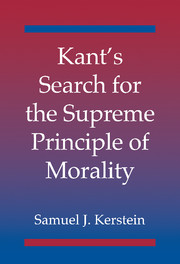Book contents
- Frontmatter
- Contents
- Acknowledgments
- Key to Abbreviations and Translations
- Introduction: Derivation, Deduction, and the Supreme Principle of Morality
- 1 Fundamental Concepts in Kant's Theory of Agency
- 2 Transcendental Freedom and the Derivation of the Formula of Universal Law
- 3 The Derivation of the Formula of Humanity
- 4 The Derivation of the Formula of Universal Law: A Criterial Reading
- 5 Criteria for the Supreme Principle of Morality
- 6 Duty and Moral Worth
- 7 Eliminating Rivals to the Categorical Imperative
- 8 Conclusion: Kant's Candidates for the Supreme Principle of Morality
- Notes
- Index
1 - Fundamental Concepts in Kant's Theory of Agency
Published online by Cambridge University Press: 06 September 2009
- Frontmatter
- Contents
- Acknowledgments
- Key to Abbreviations and Translations
- Introduction: Derivation, Deduction, and the Supreme Principle of Morality
- 1 Fundamental Concepts in Kant's Theory of Agency
- 2 Transcendental Freedom and the Derivation of the Formula of Universal Law
- 3 The Derivation of the Formula of Humanity
- 4 The Derivation of the Formula of Universal Law: A Criterial Reading
- 5 Criteria for the Supreme Principle of Morality
- 6 Duty and Moral Worth
- 7 Eliminating Rivals to the Categorical Imperative
- 8 Conclusion: Kant's Candidates for the Supreme Principle of Morality
- Notes
- Index
Summary
Aims and Limits of the Discussion
Kant peppers each of his major works in practical philosophy with comments pertaining to what it means for us, rational agents, to act. Philosophers disagree on how best to interpret these comments, which are often difficult and sometimes obscure. I offer some readings here that, I believe, cohere with Kant's texts, but they are surely not the only defensible readings. My aim in this chapter is to set out a plausible interpretation of (part of) Kant's theory of agency, an interpretation that will be useful as a reference point in discussions to come. Important issues regarding Kant's theory of agency, such as whether Kant does or should conceive of acting on a maxim on the model of Aristotle's practical syllogism, are not addressed here. A thorough reading of Kant's theory of agency, let alone a defense of it, would require a book in itself.
The chapter is divided into two main parts. The first focuses on a few key concepts in Kant's theory. In 1.2–3, I offer an account of Kant's notion of a maxim; then I turn very briefly to Kant's conceptions of the will (1.4) and of the will's “determining grounds” (1.5). The second main part of the chapter concerns Kant's account of actions not done from duty, that is, ones done on “material practical principles” (1.6–8). Understanding this account requires some painstaking textual analysis.
- Type
- Chapter
- Information
- Kant's Search for the Supreme Principle of Morality , pp. 16 - 32Publisher: Cambridge University PressPrint publication year: 2002



